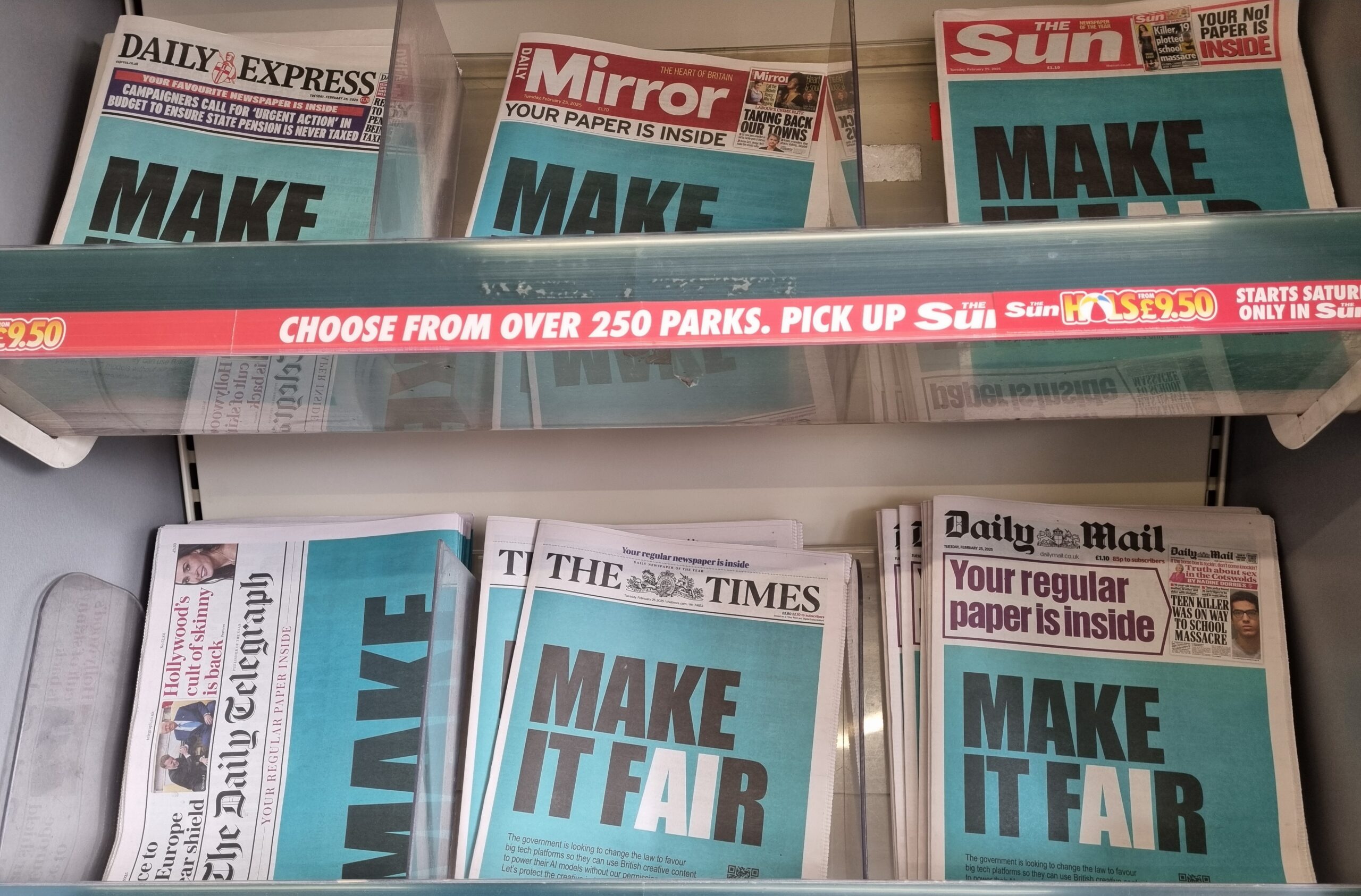By John Pickard (ALCS member)
You may have noticed this morning that every one of the regular mainstream newspapers was contained in a full-page, wrap-around advertisement. It was paid for by the Creative rights in AI Coalition, which itself is an initiative of the News Media Assocation.
The campaign has come about because the UK government is about to allow makers of AI programmes to ‘scrape’ the published works of British artists, authors, journalists, illustrators, photographers, film-makers, scriptwriters, singers and songwriters to ‘train’ and maintain AI platforms. Worst of all, the government is planning to do this without the permission of those who have created these works, and without payment.
The ALCS, the Authors’ Licensing and Collecting Society, which collects and distributes royalties to authors for books lent out by libraries, is part of the compaign and it is currently promoting the participation of all of its authors in the UK government’s consultation exercise on the proposals to allow access to AI. As the ALCL argues, the Government’s preferred solution “is to introduce a copyright exception for the use of works to train AI models, with the ability of rightsholders to ‘reserve their rights’ or ‘opt their works out’”, argueing that We believe “that this option is inadequate, unworkable and unbalanced against the interests of creators”.
The big majority of authors, including the thousands who are members of the ALCS, are not well-known celebrities and there is a very real danger that most of them, despite what is in their best interests, do not manage to lodge a copyrght “exception”.
The National Union of Journalists has written to chief executives of companies working in software development, including Microsoft, Google, OPENAI, Apple and META “to reaffirm that members do not authorise the use of any of their works protected by copyright and/or related rights (including performers rights) for the training, development, or operation of AI models”.
Copyright breaches already being realised – NUJ
The NUJ points out that “Threats of exploitation and intellectual property rights breaches have already been realised, with reports of inaccurate data used to inform AI generated stories, false attributions to journalists, and creators discovering use of their likeness without their knowledge or consent”.
It is, of course, not only writers who are at risk. As the BBC reports, “More than 1,000 musicians –including Annie Lennox, Damon Albarn and Kate Bush – released a silent album on Tuesday in protest at the UK government’s planned changes to copyright law, which they say would make it easier for AI companies to train models using copyrighted work without a licence”.
What applies to writers, also applies to musicians and other artists in general – the overwhelming majority are not well-known personalities, and by accident or design, most of them may not get around to elect to “opt out”, so their work is in danger of being pirated legally, by AI companies.
It remains to be seen how effective are the campaigns by ‘Make it Fair’ and the coalition of musicians releasing silent albums. On past experiences, one would be justified in being sceptical about government consultation exercises. Given Keir Starmer’s limitless ability to give in to all the demands that big corporations throw his way, the prognosis for AI does not look good.
Tighter ‘regulation’ will be ignored by AI companies
As much as we should support the campaigns of the ALCS and of authors, musicians and artists fighting to protect their copyrights, the direction and taken and the uses of AI are not a legal or techical issues, but a political ones. We should support the campaign of the NUJ as an integral part of the TUC, but again, we need to emphasise that the solution can only be a political one and not simply a matter of better ‘regulation’.
Those who currently control and manage AI systems are private corporations, whose ultimate aims are the pursuit of profit, and they are now known, to put it midlly, for their concern for the ‘little person’. There is ultimately no public scrutiny or control of AI systems, and it would only be a matter of time, whatever protocols and regulations are ‘in force’, before published works – the rights to which ought to belong to the original author – are reproduced, or even distorted by AI-published works.
As the NUJ points out, breaches of copyright are already taking place. It is already possible to post AI-generated fake videos of politicians saying things that are in flat contradiction to beliefs they actually hold. How long will it be, we may ask, before articles from the left press or left-wing websites are credibly faked and disseminated on social media?
The entire environment of social media is already a swamp, where disinformation, lies and distortion are commonplace. A more widespread use of AI, with free rein to mimic – with credibility – the real views and activities of others, will turn the social media swamp into a sewer.
In the labour movement, the emphasis in our campaign on AI has to be focused on ownership and control, not on regulation. Who owns the tech companies? That question immediately answers the next: who controls AI? We can be sure that ‘regulators’ will not control AI, however vigilant they may try to be.
It should be an elementary demand of the labour movement that any company attempting to develop and deploy AI should be publicly-owned and managed democratically and transparently in the interests of that same public. AI is too powerful a tool for it to be left in the hands of and used for the enrichment of a greedy handful of tech moguls.



